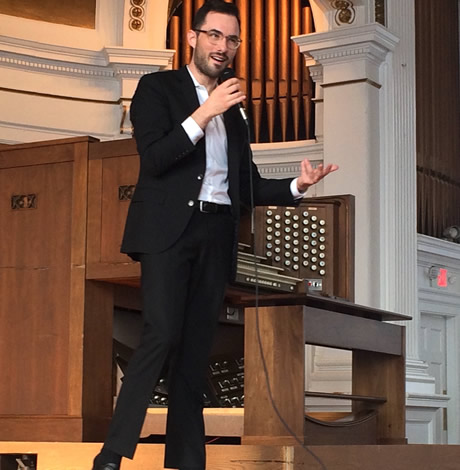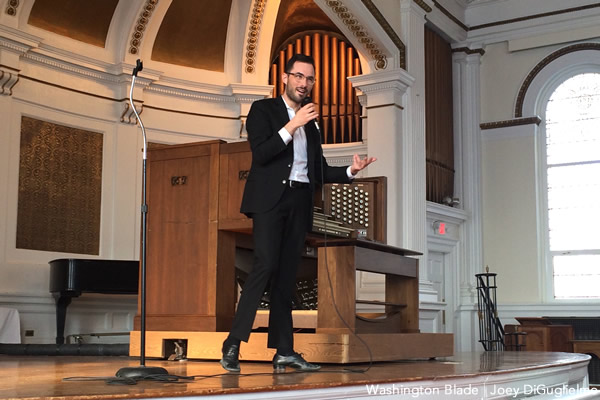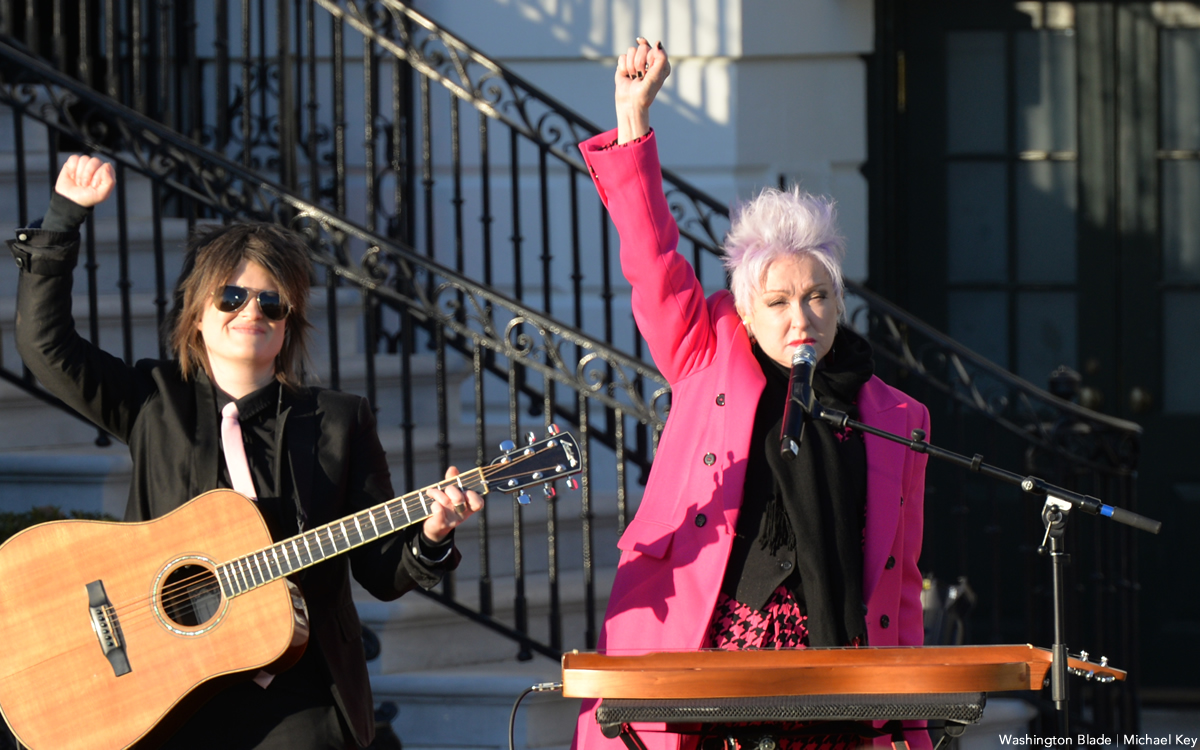Music & Concerts
Organized musings
Out recitalist Christopher Houlihan shares tricks of the trade


Christopher Houlihan at Wilson College in Chambersburg, Pa., on March 6, 2016. (Washington Blade photo by Joey DiGuglielmo)
Christopher Houlihan
Organ recital
Presented by the National Symphony Orchestra
Kennedy Center Concert Hall
Wednesday, May 4
8 p.m.
$15
Organist Christopher Houlihan took a few minutes with us by phone from Hartford, Conn., where he was playing at his alma mater Trinity College (where he’s artist in residence) in advance of his Washington recital next week. He plays the Kennedy Center on Wednesday, May 4. His comments have been slightly edited for length.
WASHINGTON BLADE: Does organ music translate well to iPods?
CHRISTOPHER HOULIHAN: I think it can. … Some pieces work better than others. I don’t tend to listen to it if I just want to have some music playing because if it’s organ music, I tend to focus on it too much. If you want the best experience possible, there’s nothing more exciting than a live organ shaking the room.
BLADE: Recording organ is hard with all the outside noise that can happen. Can engineers take out sirens and that sort of thing?
HOULIHAN: In my experience, we haven’t been able to do that. We’ve had to do another take. But yes, recording in a big city is really tough. You usually have to do it in the middle of the night. But then sometimes if it rains, you lose a whole night.
BLADE: Do you plan to keep recording and releasing CDs?
HOULIHAN: I would definitely like to do more. I have a Bach CD that’s in the works to be released. … I hope in time over what I hope is a long career that I’ll have several recordings released.
BLADE: Can you tell which stops are pipe or digital on a hybrid organ?
HOULIHAN: When they’re done well, I think they can be very effective. … It’s a tough question to answer. I can tell, but I’ve played lots of hybrid organs and completely digital organs and what matters most is if you can make music on them and you absolutely can.
BLADE: What is the consensus among elite organists about the Kennedy Center’s new Casavant organ?
HOULIHAN: It has a good reputation. I haven’t heard it myself yet but I’m excited. I’ve played lots of Casavants and some of their more recent instruments and I have nothing but good things to say. I’m sure the Kennedy Center’s is equally stunning.
BLADE: How much of a consideration is audience familiarity with certain pieces when you’re programming a recital? Are some works perhaps too much to digest?
HOULIHAN: It’s somewhat a consideration. I think a program needs to have balance so I think playing something they’re familiar with helps but I also find people like to be a little challenged and there are things they’ll like and find interesting whether they’re familiar with them or not. Most people aren’t familiar with a whole lot beyond the Toccata and Fugue in D Minor, so it’s hard to give that too much weight.
BLADE: You played at First Baptist Church in Washington in 2013. How was it for you?
HOULIHAN: I had a great time. It’s a great space for organ music. The Austin organ there is enormous and has a great variety of colors and beautiful sounds.
BLADE: You don’t seem to post much on Facebook. How do you stay focused?
HOULIHAN: I guess I’m on Facebook as much as anybody. I don’t post a lot, but when it comes time to work, I put my phone aside and focus on practicing. Then I take a break when it’s time to take a break. … I’m much more interested in reaping the benefits of practicing. It’s not especially hard once you get yourself to the organ bench.
BLADE: (Your former teacher) Paul Jacobs was here last month at the Kennedy Center. What was your biggest overall lesson from your time with him?
HOULIHAN: I think one of the things all of Paul’s students would say is the level of commitment and discipline he brings to what he does. It’s inspiring and he expects no less from his students. That’s something that’s stuck with me for sure. To get a good result, you have to put in a lot of effort. He is very demanding of that and it pays off.
BLADE: On average about how long do you spend on a major work from first read until you perform it in recital?
HOULIHAN: I have no idea. I should calculate it someday. I tend to learn slowly. I’d rather take more time learning something before I bring it on the road. That works best for me but as for a specific amount of time, I don’t really know.
BLADE: Where were you when you heard about the Supreme Court marriage ruling last year? How did you feel?
HOULIHAN: I was thrilled. My mom was visiting New York City and we went out for pizza to celebrate.
BLADE: Is that an issue you followed very closely?
HOULIHAN: It was something I’d hoped for as a gay persons and I’m thrilled it’s the law of the land. But it’s also important to me now that we continue to fight, especially for trans people.
BLADE: Has being out ever been a professional hindrance in any perceptible way?
HOULIHAN: Not that I can think of. I suppose if a church didn’t want to invite me to play because of that, I’d never know about it. My church in New York, Church of the Holy Apostles, is incredibly gay friendly.
BLADE: Do the technical challenges of playing lighten at a certain level of proficiency or are they always there?
HOULIHAN: There are always technical obstacles there for anyone who really wants to grow and challenge themselves. But they’re exciting to work on and over time you learn how to practice and how to work on those challenges. It doesn’t get easier, but you learn how to tackle them.
BLADE: You seem genuinely nice. Do people prey on that?
HOULIHAN: I certainly know how to stand up for myself when that’s required.
Music & Concerts
Washington chorale kicks off Christmas with vibrant program
‘Thine Own Sweet Light’ concerts planned

The full Washington Master Chorale will return for its annual holiday concert tradition with “Thine Own Sweet Light” on Friday, Dec. 19 and Sunday, Dec. 21 at St. Ann’s Catholic Church (D.C.) and Church of the Epiphany (D.C.).
The concert will feature the rich sounds of the 50-voice, a cappella chorus performing lush, seasonal choral music inspired by the theme of light. Highlights include Edvard Grieg’s “Ave Maris Stella,” Eric Whitacre’s “Lux Aurumque,” and Christopher Hoh’s “Holy, Holy, Holy is the Lord God of Hosts.” The program will also present a new work by Barcelona composer Josep Ollé i Sabaté, along with charming holiday folk songs and seasonal favorites.
For more details, visit the Washington Master Chorale website.
Music & Concerts
Queer mega stars (and allies) ready to take D.C. stages this fall
Watch LGBTQ icons light up stages across the DMV as they sing, dance, and drag their way through spectacular shows.

One of the best ways to welcome fall is by catching LGBTQ performers (and their allies) lighting up some of the D.C. area’s biggest stages. From country and pop to drag and rock, the season is packed with shows you won’t want to miss.
Maren Morris – The country, rock, and pop diva—known for hits like “The Bones” and for standing up against Nashville’s anti-LGBTQ voices—takes the stage at Wolf Trap (1551 Trap Rd, Vienna, Va.) on Friday, Sept. 12 at 8 p.m. Tickets start at $64.
RuPaul – The mother of modern drag and host of “RuPaul’s Drag Race” will spin a DJ set at Echostage (2135 Queens Chapel Rd NE) in Northeast D.C. on Sept. 20. Before RuPaul swaps wigs for headphones, Trade and Number 9 owner Ed Bailey will warm up the decks. For tickets and details visit echostage.com.
Conan Gray – The queer pop prince, celebrated for his Gen Z anthems like “Heather” and “Maniac,” brings his Wishbone Pajama Show to EagleBank Arena in Fairfax, VA, (4500 Patriot Cir) on Sept. 20 at 8 p.m. Tickets start at $113. For more info visit shop.conangray.com/pages/tour.
All Things Go Music Festival – With a lineup that includes Noah Kahan, Lucy Dacus, Kesha, Clairo, Doechii, and more, the beloved LGBTQ-friendly festival takes over Merriweather Post Pavilion (10475 Little Patuxent Pkwy, Columbia, Md.) Sept. 26–28. For tickets and details visit allthingsgofestival.com.
BERTHA: Grateful Drag – This unique tribute brings drag artistry and the sounds of the Grateful Dead to The Atlantis (2047 9th St NW) on Sept. 27. Tickets start at $47 at theatlantis.com.
Peach PRC – Rising Australian pop star and out lesbian, whose confessional tracks like “Perfect for You” and “Forever Drunk” have made her a queer TikTok darling, performs at The Atlantis on Sept. 29 at 6:30 p.m. The show is general admission only. Additional details are on theatlantis.com.
Addison Rae – The TikTok star-turned-pop princess, who’s crossed over into music with glossy hits like “Diet Pepsi” brings her sold out show to The Anthem (901 Wharf St., S.W.) on Sept. 30. Tickets are sold out, but resale options start around $80. For more info visit theanthemdc.com.
The Rocky Horror Picture Show 50th Anniversary – Celebrate the cult classic that’s been a queer midnight-movie staple for decades, with Barry Bostwick (a.k.a. Brad Majors) at the Warner Theatre (513 13th St., N.W.) on Oct. 2 at 8 p.m. Tickets start at $41 via Ticketmaster.
Chaka Khan, Patti LaBelle, Gladys Knight & Stephanie Mills – Four legends, one stage. Between Khan’s funk, LaBelle’s soul, Knight’s R&B, and Mills’ powerhouse vocals, this concert at Capital One Arena (601 F St NW) on Oct. 3 at 8 p.m. promises pure diva magic. Tickets start at $103. For more details visit capitalonearena.com.
Lorde – Joined by The Japanese House and Chanel Beads, the Grammy-winning New Zealand singer-songwriter behind “Royals” and “Solar Power” returns to The Anthem on Oct. 4 at 7 p.m. Lorde has long been embraced by queer fans for her dreamy pop and subversive lyrics. For more info visit theanthemdc.com.
Andy Bell (of Erasure) – The British queer rock icon, best known for synth-pop classics like “A Little Respect” and “Chains of Love,” brings his Ten Crowns Tour to the Lincoln Theatre (1215 U St., N.W.) on Friday, Oct. 17 at 8 p.m. Tickets are $90.45.
Doechii – The self-described queer “Swamp Princess”—and WorldPride 2025 headliner—continues her breakout year with the Live from the Swamp Tour at The Anthem on Oct. 21 at 8 p.m. Known for blending rap, R&B, and avant-garde performance art, Doechii is one to watch. Tickets start at $153.
Neon Trees – The out-and-proud Utah rockers behind “Everybody Talks” and “Animal” perform at the Lincoln Theatre on Friday, Oct. 24 at 8 p.m. Lead singer Tyler Glenn, who came out publicly in 2014, has become a strong queer voice in alternative rock. For tickets and info visit impconcerts.com.
Sasha Colby – The “RuPaul’s Drag Race” Season 15 winner strips down on the Stripped II Tour at the Warner Theatre on Nov. 2 at 8 p.m. Tickets available now on Ticketmaster.
Lola Young – The bisexual indie-pop sensation, whose raw songwriting has earned her millions of TikTok fans and multiple chart soaring hits visits The Anthem on Nov. 9 at 8 p.m. Tickets are still available.
Opera Lafayette
Featuring Mary Elizabeth Williams as Dido
+ Elijah McCormack, Chelsea Helm
Oct. 16, 7:30 p.m.
Sixth & I
PostClassical Ensemble
The Pale Blue Do: A Musical Voyage Inspired By Nature
Featuring National Geographic’s Enric Sala, Guest Curator
Wednesday, November 19, 7:30 p.m.
Terrace Theater
Washington Concert Opera
Starring Kate Lindsey, Theo Hoffman, John Moore, and Fran Daniel Laucerica
Nov. 23, 6 p.m.
Lisner Auditorium
Washington Master Chorale
An intimate a capella concert taking place in an architectural jewel, featuring cherished choral gems from Anglican and Catholic tradition and early American hymns. The concert will also present the world premiere of Christopher Hoh’s Holy, Holy, Holy is the Lord God of Hosts, and hymn singing featuring Robert Church, organist and choirmaster at St David’s.
Oct. 18, 7:30 p.m.
October 19, 5 p.m.
St. David’s Episcopal Church
Music & Concerts
Cyndi Lauper ready to have fun in Virginia
Superstar to bring final leg of farewell tour to Jiffy Lube Live

Superstar Cyndi Lauper will bring the final leg of her farewell tour “Girls Just Wanna Have Fun” to Bristow, Va., on Thursday, July 24 at Jiffy Lube Live.
Lauper’s international Farewell Tour – her first major headlining run in a decade – kicked off in North America last October, and included her first time ever headlining (and selling out) Madison Square Garden. Lauper’s performances have earned raves from the New York Times, Rolling Stone, Billboard, and many more, and surprise guests have included Chaka Khan, Sam Smith, and Hayley Williams. The tour just visited the U.K. and Europe, and will head to Australia and Japan in April.
Tickets are available on Live Nation’s website.
-

 National5 days ago
National5 days agoTrump falsely links trans people to terrorism
-

 Virginia5 days ago
Virginia5 days agoFellow lawmakers praise Adam Ebbin after Va. Senate farewell address
-

 National5 days ago
National5 days agoLGBTQ activists mourn the Rev. Jesse Jackson
-

 Massachusetts4 days ago
Massachusetts4 days agoEXCLUSIVE: Markey says transgender rights fight is ‘next frontier’




















